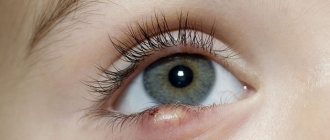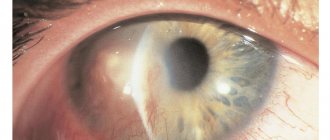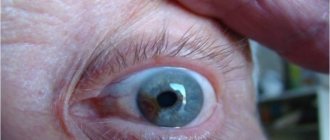The condition in which the vein under the eye twitches is medically called myokymia or nervous tic. This phenomenon can be caused by a number of factors, among which the most common causes are overwork and insomnia. If the vein under the eye pulsates for a short time, then there is no cause for concern, but when such a condition is observed systematically, you should not delay a visit to a medical facility.
Why does the muscle under the eye twitch?
The life of a modern person with its problems and constant workload provokes a nervous environment, lack of sleep and constant stress. Naturally, such phenomena do not pass without leaving traces for human health: accumulating, all the negativity suddenly manifests itself very unexpectedly - the nerve under the eye begins to twitch and you do not know what to do. Initially, the patient does not react in any way to such an annoying phenomenon, but then his irritation and anxiety begin to increase.
It makes no sense to deny the fact: if there is twitching under the eye, this is a sign that the body is signaling overwork. Perhaps this is normal overwork and the person needs a good rest, but such a sign can also signal certain problems of the internal organs. If a nervous tic begins to recur, this fact cannot be ignored. Hurry to a neurologist - he will determine the reason why your eye is twitching and prescribe the optimal treatment.
You should not neglect medical help, because such a seemingly innocent sign can be associated with serious illnesses: stroke, multiple sclerosis, head injury, middle ear disease and others.
The problem “a nerve is twitching under the eye, what should I do?” may initially seem not entirely serious and even funny. Perhaps someone finds it funny to watch a friend's right eye twitch or the vein pulsate. But if the nerve under the eye twitches for a week or even a month, it’s no longer a laughing matter.
Why is this happening? There is a nerve twitching under the eye, what should I do? Let's try to figure it out.
Diagnostics
If eye twitching bothers you frequently, you should consult a doctor who will prescribe an examination and identify the causes of the manifestation.
If a person experiences a pulsating vein or twitching nerve under the eye, it is important to seek medical attention as soon as possible. At the appointment, the neurologist will find out how long ago the muscle contractions began, how long the twitching lasts, and whether any other undesirable symptoms are present. Based on the medical history, the doctor prescribes the required examinations. Most patients will need to undergo an electromyogram, a nerve conduction study, as well as a general and biochemical blood test.
Why is constant muscle twitching dangerous?
Constant muscle twitching is dangerous to the musculoskeletal health of the human body in the long run. It is important to understand that muscle twitching in different parts of the body leads to a disruption in the transmission of nerve impulses. As a result, some of the myocytes may contract while the underlying tissue relaxes. This is how ectopic foci of unstable muscle tension (trigger points) are formed. They cause constant muscle pain and partial destruction of myofibrils.
The feeling of muscle twitching is not just an unpleasant feeling. Blood microcirculation is disrupted at the capillary level, and dysmetabolic processes begin. Such a muscle loses its ability to provide complete diffuse nutrition to the cartilage tissue of large joints of the lower upper extremities and intervertebral discs. As a result, deforming osteoarthritis, osteochondrosis and other pathologies develop.
Even if you are sure that the twitching is associated with osteochondrosis, do not hesitate to seek medical help. The sooner you start treatment, the higher the chances of a full recovery.
Why does the nerve under the eye twitch and what to do?
Because the main causes of a twitching eye are:
- stress;
- lack of sleep;
- weakened nervous system;
then it is these nuances that you should pay serious attention to.
Not only adults, but also children, especially preschoolers, suffer from nervous tics. It is this age category that has the most unstable nervous system - this is explained by the peculiarities of the development of the child’s body. Conflict family situations and a negative attitude from parents can provoke the development of a child’s nervous tic.
Doctors say that the muscle under the eye twitches is often caused by eye fatigue (for example, due to spending a long time in front of a computer monitor). In this case, you do not need treatment - rest more often and do this exercise: closing your eyes, take a few energetic breaths and exhale. Repeat the exercise 5–6 times with short breaks.
The eye twitches - what measures to take?
When you start having an eye tic, first try to determine the possible cause of its occurrence. Analyze your daily routine. If you don’t get enough sleep, are experiencing emotional distress, have recently been ill, or work too much, then your body is giving you a signal that it is overtired.
To eliminate muscle contraction for these reasons, follow these steps:
- try to get enough sleep;
- try to rest;
- drink sedatives: it is recommended to use herbal sedatives (motherwort, St. John's wort, lemon balm, mint, valerian);
- If possible, reduce your time working at the computer;
- change your diet: eat more fruits, vegetables and greens. To enrich the body with magnesium and calcium, it is recommended to include nuts, sunflower seeds, legumes, bananas, sesame seeds, green vegetables, rye bread, hard cheese, buckwheat in the diet;
- limit the consumption of alcohol, coffee, strong tea, spicy foods;
- take breaks from work (15 minutes), you can also alternate work with eye exercises;
- Avoid stressful situations if possible.
First aid
Primary measures to prevent involuntary muscle contractions include the following:
- close your eyes and open your eyes (should be repeated several times);
- blink your eyes for a few seconds;
- close your eyes and relax, sit in this state for at least 10 minutes;
- you can make a compress;
- massage the arches above your eyebrows.
What are the causes of contractions in children and adolescents
Often, this phenomenon in this category is not a sign of serious pathologies, but still, contacting a doctor would not be amiss: this will help to find out why the child periodically experiences muscle twitching.
Experts attribute the appearance of such an anomaly to several factors. The most common is genetic predisposition. In addition, numerous studies have found that girls suffer from muscle twitching much less often than boys, while in the latter it occurs in a more severe form.
Quite often, muscle twitching occurs after:
- stress;
- past illness;
- a large number of unpleasant procedures (injections, hospital stay).
And yet, one of the particular factors in the appearance of this phenomenon is the “unhealthy” atmosphere in the family, which has an extremely negative effect on the child’s nervous system.
To correct this condition, it is recommended to exclude provoking causes, begin to follow a diet and sleep schedule, and normalize physical activity. Family psychotherapy can also be used.
The main causes of twitching under the eye
Twitching under the eye (this feature is also called a nervous tic) can occur for a variety of reasons. With such a problem, it becomes clear to everyone around that the person’s eyelid or under the eye is twitching. It looks ugly, and a person feels obvious discomfort and inconvenience from it.
So, what causes can be identified for twitching under the eye?
- Physical and mental fatigue.
- Lack of sleep.
- Tense rhythm of work.
- Accumulating fatigue from regular and long trips.
- Head injuries.
- Postoperative weakness.
- Consequence of birth trauma.
- Headaches associated with meningitis.
- Heredity.
- Presence of worms or other parasites.
Get tested for the presence of helminths and other parasites in the body. If this is the underlying cause, treatment is carried out using medications: Vermox, Mezamin, Praziquantel, Tinidazole, Ornidazole, Triziquantel and others. It depends on the type of helminths.
In addition to medications, herbal remedies, ozone therapy and homeopathic remedies are used quite effectively. You can use traditional methods:
- eat pumpkin seeds;
- sauerkraut juice;
- tansy decoction, etc.
The nerve under the eye twitches: what to do?
Visit a neurologist, as the cause may be a head or even brain injury, which changes the flow of nerve impulses to the facial muscles. In some patients, the so-called nystagmus developing due to impaired contractility of the motor activity of the eye muscles. In such cases, spontaneous movements of the eyeballs and contractions of the eyelid muscles are observed.
Once the causes of the tic have been established, treatment can begin. But first of all, we need to focus on prevention, since preventing a disease is much easier than then getting rid of it.
- Try to stick to the regime: sleep at least 7 - 8 hours a day.
- Watch your diet: it should be balanced.
- It is necessary to calm the nervous system. If you cannot cope on your own, seek the help of a neurologist or psychologist. The use of soothing herbal remedies or herbal infusions (mint, motherwort, hop cones, lemon balm, etc.) also gives a good effect.
- Instead of strong tea and coffee, drink green tea.
- Wear sunglasses. They will protect your eyes from direct sunlight and ultraviolet radiation, from dust, wind, etc.
- Don't forget to apply compresses.
- It is advisable to reduce your workload and spend less time in front of a PC monitor and TV.
- Special exercises for the eyes (relaxing, special complex) also have a positive effect.
Why can the lower eyelid twitch?
When the lower eyelid twitches, they say that a nervous tic has begun. “Nervous” - because the problem is related to the nervous system. Usually we first decide to do an action “in our head”, and then only the brain sends an electrical signal along the nerve fibers leading to the muscles. The result is a reduction. But with a tic, the contraction signal comes without the participation of the person’s consciousness, so an involuntary twitch occurs. Various reasons lead to impaired transmission of nerve impulses. Let's look at them.
Nervous fatigue
If there is twitching under the eye, the No. 1 reason for this condition is nervous exhaustion. This leads to:
- Stress;
- Depression;
- Lack of sleep;
- Anxieties and fears.
Pregnant and lactating women, as well as residents of megacities, whose rhythm of life is off scale, often experience nervous fatigue. Changing place of residence, work, communicating with unpleasant people - all this leads to irritation. If it is not removed, it accumulates and is expressed by symptoms such as nervous tics.
The lower eyelid may twitch if there is a tense situation in the family. Moreover, this can affect not only adults, but also children, who may also begin to stutter.
Eye fatigue
Another reason why it twitches under the eye is excessive load on the visual organs. Causes eye fatigue:
- Working at a computer;
- Watching TV and playing video games;
- Reading in dim light or looking at small print;
- Long-term work with small parts;
- Work involving hand writing;
- Work that requires concentration of attention on objects located directly in front of the eyes.
People who suffer from farsightedness or nearsightedness, but who refuse vision correction with glasses or contact lenses, also strain their eyes.
Overexcited state
When the nervous system is overexcited, the speed of transmission of electrical impulses increases. But at the same time they become disordered, so a nervous tic develops. An overexcited state is caused by:
- High emotional stress;
- Frequent consumption of coffee;
- Abuse of strong tea;
- Drinking alcoholic beverages;
- Passion for energy drinks.
Sometimes drinks, on the contrary, help to cheer you up, but their abuse is fraught with problems with the nervous system.
Avitaminosis
For the proper functioning of the nervous system, B vitamins are necessary, especially for pyridoxine - vitamin B6. It is also important to consume enough magnesium. But modern people do not think about proper nutrition; they exhaust themselves with diets or, on the contrary, prefer to eat unhealthy but tasty foods. This is one of the reasons why the lower eyelid twitches.
Diseases
If it is relatively easy to cope with fatigue, overexcitation or vitamin deficiency, then a nervous tic that has developed against the background of other diseases is difficult to treat. First you need to understand why the nerve under the eye twitches, and then eradicate the reasons that led to periodic twitching of the eye. Chronic illnesses can take weeks, even months, to heal.
If your eye constantly twitches, get checked for the following conditions:
- Allergy . It can be expressed by a rash on the body, a runny nose or conjunctivitis, or all three at once. If the allergic reaction affects the mucous membranes of the eye, then their irritation can lead to spasm of the muscles around the eye. Both the left eye and the right can twitch. Both eyes rarely twitch.
- Chronic tonsillitis . It would seem, what is the connection between inflammation of the tonsils and periodically twitching eyes? But it is there. With a severe sore throat, a person often swallows, which spasms the facial muscles, including the muscles under the eye. For example, if the right eye twitches due to chronic tonsillitis, then after the tonsils are removed, the tic of the lower eyelid also goes away.
- Organic lesions of cerebral vessels . Atherosclerosis and other cerebral vascular diseases lead to circulatory disorders. If problems affect the departments responsible for contracting and relaxing the muscles around the eye, then they may experience involuntary twitching. Moreover, if the lower eyelid of the right eye twitches, then the vessels in the left lobe of the brain are affected, and vice versa.
- Nystagmus . This is the name of an eye disease characterized by involuntary oscillatory movement of the eyeballs to one side. This disorder leads to spasm of the periocular muscles. Nystagmus can be unilateral or bilateral. This explains why the lower eyelid of the left eye twitches if the disease is left-sided, and the right eyelid twitches when the right eye is affected.
- Facial hemispasm . This disease is characterized by damage to one of the facial nerves. As a result, one half of the face begins to twitch. This is one of the reasons why it may twitch under the left or right eye.
Important! If your eye twitches after hitting your head, you may have suffered a brain injury. See a doctor immediately to avoid the negative consequences of a bruise.
Nervous tic on the face: causes
With vascular lesions of the brain, atherosclerosis, a stroke or even tuberculosis lesions, various disturbances in facial expressions can occur, including tics;
When various parts of the cerebral cortex are affected, similar symptoms may occur. This most often occurs when the frontal lobes are affected.
In the case of tumors and other neoplasms, most often it is not tics that occur, but focal symptoms, for example, weakness and paresis of facial muscles, nasal and slurred speech, and various oculomotor disorders occur, for example, divergent strabismus when the peduncle of the abducens nerve is pressed.
Most often, tics and other facial disorders occur from damage to the extrapyramidal system. Moreover, this can be either hyperkinesis or hypokinesis, when the face resembles an amicable, motionless mask, devoid of any emotions. This happens with parkinsonism.
With hepatocerebral dystrophy, in which copper metabolism is disrupted, facial tics are accompanied by symptoms such as a mask-like face, drooping of the lower jaw, violent laughter and crying.
In addition to really serious reasons, functional disorders lead to tics, for example, such as asthenia after illnesses, neuroinfections, chronic fatigue, vitamin deficiency, and emerging depression.
If a nervous tic appears on a child’s face shortly after birth , then we can hope that by the age of one year everything will go away. Tic is associated with immaturity of the nervous system. And if hyperkinesis occurs in a child of primary school age, then you need to deal with the daily routine and increased workload. It is necessary to change the daily routine, reduce the study load. A child should spend at least 9 hours sleeping. Therefore, glycine can be useful for nervous tics in a child if given at night.
Why does the muscle under the eye twitch?
Any negative emotion in a person, if not released, can result in some kind of nervous symptoms. As a result, the muscle under the eye begins to twitch, which is far from the worst thing - much worse if diseases of the internal organs occur.
Changes in neuromuscular tissue provoke a painful change in the body: the muscle under the eye twitches. Usually the lower eyelid twitches under the eye and it is not possible to consciously stop it. The process of tic formation is explained by spontaneous contractions of facial muscles. They can be represented by one muscle or a group of muscles. Usually the nerve begins to twitch suddenly, but in the same way the tic spontaneously stops.
The muscle twitching under the eye may indicate the presence of a nervous tic. In the first case, the process is caused by psycho-emotional trauma or damage to the central nervous system.
A secondary nervous tic is formed as a result of exposure to repeated diseases. The main etiological factors of such involuntary muscle contraction are:
- psycho-emotional states;
- genetic relationship (Tourette's syndrome);
- accumulated fatigue;
- constant irritating factors;
- diseases of the central nervous system;
- endocrine diseases (for example, diabetes);
- viral infections;
- injury to the facial nerve and its endings;
- eye strain due to prolonged viewing of TV shows or working on a PC;
- disturbed sleep patterns;
- lack of B vitamins and magnesium;
- various forms of neuroses.
In many cases, the cause is hard mental work.
The muscle under the eye twitches: signs and causes
A person may not even always be aware of the moment and understand why the eye is twitching. In most cases, this phenomenon is not even felt. First of all, this applies to children, since adults almost always feel twitching under the eye.
Very often, people feel contractions of the facial muscles and can also prevent them. The eye twitch may only last for a few seconds, but it can be repeated for a long time - for hours or even several days. Sometimes the tic disappears when the environment changes, but this does not always happen. It happens that even at rest, the twitching intensifies, causing even greater discomfort.
Why does the muscle under the eye twitch? Most people do not notice any additional symptoms, such as worsened vision or pain. Nerve pain can occur only during facial nerve paralysis, and also if the tic becomes evidence of serious diseases of the central nervous system.
As a rule, the nerve under the eye twitches only on one side, but sometimes twitching of the nerves on the other side of the face is also observed. This process complicates the emotional state of the patient. Children suffering from nervous eye twitching are usually uncommunicative and try to avoid the company of their peers, and this negatively affects their socialization.
Reasons for development
Often the muscle under the eye twitches on both or one side for several minutes, appearing and passing for no reason. However, situations cannot be ruled out when such a phenomenon bothers the patient for a long time; in some people, the nerve is systematically shortened for more than one year. The following factors can provoke this.
- Fatigue, disturbed sleep patterns, insomnia. These are the most common reasons that cause pulsation of the vein under the right eye or left visual organ. Specific treatment for this condition is not required; the patient should only normalize his daily routine.
- Unhealthy diet and lack of healthy elements. You should not compensate for the lack of vitamins on your own; you need to consult a doctor who, after conducting research, will prescribe a suitable vitamin and mineral complex.
- Irritation over a long period and frequent stress. It is not always possible to cope with these phenomena on your own, so you may need the help of a psychotherapist.
- Increased load on the visual organs. The problem can be caused by systematically standing in front of a computer screen, reading in poor lighting, or overusing mobile gadgets.
- Allergy. Histamine, which is released when the eyes rub, causes contraction of the eye muscle and twitching of the lower eyelid.
- Dryness of the visual organs. This is an equally common reason, which is observed during prolonged work at the monitor, the use of antihistamines or antidepressants.
- Abuse of caffeinated and alcoholic drinks.
How to treat muscle twitching
Before treating muscle twitching, you need to conduct a thorough diagnosis and make an accurate diagnosis. This is a symptom, not a disease. Therefore, it will not be possible to treat it separately. After making a diagnosis, the doctor develops an individual course of therapy.
To treat muscle twitching due to osteochondrosis, we use the following methods:
- traction traction of the spinal column – relieves compression from the radicular nerves and restores the physiological dimensions of the intervertebral spaces, thereby quickly eliminating pain and discomfort in the muscles;
- osteopathy - to restore the normal position of the vertebral bodies, improve the condition of soft tissues (ligaments, muscles and tendons);
- massage – to restore microcirculation of blood and lymphatic fluid;
- therapeutic exercises and kinesiotherapy to restore the tone and performance of the muscular frame of the back.
In some cases, we use laser therapy, physiotherapy, electrical myostimulation and other types of therapeutic interventions. The course of treatment is developed individually. We recommend making an appointment for a free appointment with a vertebrologist, neurologist or orthopedist at our manual therapy clinic in Moscow.
Nerve twitches under the eye: diagnosis and treatment
In order for the doctor to prescribe optimal therapy, you should resort to diagnostics, including information:
- about the spread of the disease;
- about the examination of the patient;
- about conducting research.
The examination is carried out by a neurologist. Consultation with an ophthalmologist and neurologist is also recommended. To be sure that there are no tumors in the skull, an X-ray examination or MRI should be performed. A psychiatrist’s opinion is also important in diagnosis, in order to exclude possible organic diseases in the brain.
Therapy should eliminate the main etiological factor. For example, a nervous tic was triggered by a viral infection. In this case, antiviral drugs are prescribed. If the eye twitches due to emotional stress, the patient is advised to rest completely.
If such a process is observed in a child, the doctor must give his parents an explanation that it is necessary to eliminate all conflicts in the family, as well as normalize the home environment and visit a psychotherapist. To eliminate the manifestations of nervous tics, sedatives and muscle relaxants are prescribed. A good effect is achieved with the help of herbal preparations (valerian or motherwort). In certain cases, Botox injections are used.
Twitching under the eye, what should I do? If you experience systematic twitching, you should consult an ophthalmologist and a neurologist. If no pain is observed during twitching, the following measures are taken:
- Factors that have a negative impact on the patient’s psychological state are eliminated.
- The patient is advised to increase sleep duration.
- Minimize the amount of time you spend in front of the computer and TV.
- Special gymnastics are prescribed: with your eyes closed, you need to count to 65, and then open your eyes wide. Repeat 5 times.
- You should take natural sedatives: decoctions of chamomile, lemon balm, and valerian extract.
Treatment of neurotic tics
Light sedatives, proper nutrition (you need to eat often, 4-5 times a day) and walks are enough. Protect yourself from negative information and scary films with scenes of violence. Don't forget about moderate physical activity in the fresh air.
If there was a traumatic situation, consult a psychotherapist. Individual and group therapy can be effective. The doctor determines the technique. In extreme cases, antidepressants or other medications that correct the mental state may be prescribed. In addition to them, the doctor may prescribe muscle relaxants - medications that relax the muscles.
Nervous tics, as a rule, affect neurotics, not psychotics. A neurotic person is characterized by emotional instability. He is unsure of himself, may have phobias and manifestations of asthenia (lethargy, apathy). Treatment often ends with a neurologist.
Causes of eyelid spasm
Caffeine and alcohol
Drinks with caffeine (tea, coffee, carbonated drinks) and alcohol consumption are considered possible causes of eye twitching. You need to stop eating such products for a while.
Vitamin deficiency and magnesium deficiency
Vitamin deficiency and magnesium deficiency are a serious reason why the right or left eye twitches. The body may receive enough magnesium, but its absorption requires B vitamins. If you have not been on vacation for a long time and have recently experienced a harsh winter, diversify your diet with fruits and juices, eat nuts, legumes, cereals, pumpkin and sunflower seeds, fish , black bread and chocolate. Get some sun. Additionally, you can purchase vitamins in tablets or syrup at any pharmacy.
Spending a long time at the computer
It would seem how this could be connected with a nervous tic of the eye. But experts stand their ground - a long stay in front of the monitor can cause an unpleasant phenomenon when the eye pulsates.
What to do if your eye twitches for this very reason? It is necessary to reduce the time spent in front of the computer, take breaks more often, 10-15 minutes per hour, during which it is advisable to perform several physical exercises. It is recommended to do gymnastics specially designed for the eye muscles. If the eye muscle is very tense, try applying a swab soaked in novocaine solution to the twitching eyelid.
Chronic fatigue
The most common reason why the right or left eye twitches. First you need to get some sleep. Try to go to bed early, no later than 10 p.m. Before going to bed, do not watch TV, exclude computer games and mobile phones. But one night of restful sleep will not be enough. Review your daily routine. A healthy person needs seven to eight hours of uninterrupted sleep.
Stress and nervous shock
This reason is closely related to the previous one. Stress is the constant impact of the environment on the body, but when a person does not rest, stress tends to accumulate and destroy. Difficult life situations: serious illness or death of loved ones, problems in a team or family, can also cause uncontrollable spasms of the eye muscle. More than 80% of all diseases occur due to stress.
When a nervous tic of the eye occurs for this reason, one can usually also observe a symptom such as shifting eyes. Take a course of sedatives. Don't rush to buy antidepressants; a decoction of chamomile or mint, tincture of motherwort, hawthorn or valerian are suitable. Don't forget about getting enough healthy sleep.
If the situation does not normalize and the muscle also pulsates, it is better to seek help from professionals - a neurologist and psychologist.
Dry eyes
Old age, fatigue, cigarette smoke, spending a long time at the computer, taking medications, wearing contact lenses - all this has a detrimental effect on the condition of the eye itself as an organ. It is often observed that the lacrimal glands do not secrete enough tear fluid. The cornea is not moisturized. This can also cause eyelid pulsation. In this case, artificial tears will help you - a drug that can be purchased at any pharmacy without a prescription. They need to wash their right or left eye several times a day.
Allergy
When allergies worsen, the eyes experience enormous stress - they become red, inflamed, and watery. When you rub your eyes to relieve itching, the body produces a significant amount of histamine, which causes muscle spasm. In such cases, the ophthalmologist usually prescribes antihistamines. Their use should only be carried out under the supervision of a doctor, since this coin also has a downside: antihistamine drops can cause dry eyes, which is also one of the causes of myokymia.
Infectious diseases
Infectious diseases, such as acute respiratory viral infections or acute respiratory infections, due to a decrease in immunity, can also easily provoke a nervous tic of the eye. This cause most often affects children and people with a weak or weakened nervous system. That is, here we also see a close interaction with such reasons why the eye twitches, such as stress, fatigue and vitamin deficiency.
In addition, a nervous tic of the eye can occur after local diseases such as conjunctivitis, keratitis or blepharitis. This is due to the fact that during eye diseases, pain and inflammation force a person to constantly blink, straining the eye muscle.
Heredity
Often, parents of children who complain that the right or left eye is twitching remember that they had a similar problem. Some experts are sure that convulsive eye twitching is transmitted genetically.
What to do if there is twitching under the right or left eye?
Twitching of the left or right eye occurs quite often in people. It can be either congenital or acquired. Let us dwell in more detail on acquired twitching. There are 2 types of psycho-emotional trauma:
- acquired as a result of stress (acute);
- chronic form.
If it twitches under the right eye or twitches under the left eye, you cannot leave it to chance. After a certain period of time, the pulsation can change, becoming a nervous tic.
Why is it twitching under my right eye?
Twitching under the right eye can be caused by a variety of reasons. In order to find out the cause, you should urgently visit a doctor. Many people make the mistake of thinking that if a problem concerns the eyes, only an ophthalmologist can solve it.
Why is it twitching under my left eye?
This may be an indicator of hemifacial facial spasm - the onset of a serious illness. If the symptom is also accompanied by noise in the ear, then we can talk about contraction of the stapedial muscle.
Why does the nerve under the eye twitch? In this case, everything is more complicated, since the nerve under the eye twitches and the reasons in vain seem to be of little seriousness. If you study the problem deeper, you will discover the complex human drama behind it. That is why you should seek help from a neurologist, and sometimes a psychotherapist.
Only after finding out the real reason why the eye is twitching, the doctor prescribes sedatives (usually glycine), as well as medications containing calcium (since it is the lack of calcium in the body that affects spontaneous muscle contractions).
However, whatever the reasons why the nerve twitches under the eye, the fact becomes obvious: you will not get by with medications alone.
First of all, follow simple rules:
- get more rest.
- get enough sleep.
- perform simple physical exercises.
- optimize your diet:
- Nuts, soybeans, blueberries, and sea fish will help.
- carbonated water, strong black tea and coffee should be excluded from the diet.
Self help
If you notice trembling under your left or right eye, you need to analyze your lifestyle. It is important to take into account all stress factors: lack of sleep, anxiety, nervous shock, irregular work schedule. If at least one of these factors is present, the body signals overwork. It is urgent to take measures to normalize the situation:
- Reduce time spent working at the computer.
- Avoid eating: spicy foods, coffee, strong tea, alcohol.
- Avoid stressful situations. If this is impossible, you need to abstract yourself.
- Rest more, if possible, take a vacation or a few days off.
- Get enough sleep.
- It is recommended to take a course of using soothing herbs (lemon balm, valerian, motherwort, St. John's wort, mint).
- While working, you need to take a 15-minute break every hour.
- Perform eye exercises.
- Add to your diet: nuts, greens, fruits, vegetables, legumes, sesame seeds, rye bread, buckwheat, bananas, sunflower seeds.
To immediately alleviate the condition, it is recommended to carry out a series of simple eye exercises. Additionally, you can perform auxiliary procedures in the form of compresses and massage.
Massage to relieve tension:
- 1. Using your index fingers and thumbs, you need to massage the brow ridges. Thumbs rest on cheeks. The index fingers are located above the eyebrows and move from side to side along the line of arcs.
- 2. Using your index fingers and thumbs, you need to press on the points near the inner corners of the eye.
- 3. Massage the temples and the point behind the ear in a circular motion using your index fingers.
Additional measures to alleviate the condition:
| Eye exercises |
|
| Compresses |
|
| Relaxation | Close your eyes and completely relax. Sit in this state for 30 seconds to a minute |
If the procedures performed did not help alleviate the condition, the cause of the tic is not nervous overstrain. You need to see a doctor.
Why does the cheek twitch under the eye: what to do?
The cheek under the eye may twitch due to contractions of the eyeball muscles. And although this does not bring serious inconvenience, it is nevertheless an indicator of certain problems.
If the cheek twitches under the eye, you should find out the exact cause of the occurrence, since frequent twitching can lead to facial hemispasm, causing visual dysfunction. Cheek twitching under the eye causes:
- Frequent stress and unstable psyche. Overexertion of muscles leads to the production of lactic acid and pain.
- Dry eyes caused by prolonged time spent watching TV or PC monitors.
- Lack of magnesium in the body, as well as vitamins B6 and B12.
- Allergies, acute neurotic reactions.
- Diseases of the central nervous system that could exist even in childhood.
Why does the skin under the eye twitch? This is most likely due to spontaneous contraction of the eye muscles. Although there is no obvious discomfort from this, the symptoms can be caused by several problems.
The muscle under the eye twitches, what should I do? It is necessary to find out the cause, since systematic twitching can cause facial hemispasm, which leads to visual dysfunction.
Why does the cheek under the eye twitch? Most likely, one or more of the following reasons occur:
- Prolonged stressful situations, as well as unstable mental states, cause muscle strain. As a result of such processes, lactic acid is produced, causing pain.
- Dry eyes caused by prolonged sitting at a computer monitor.
- Deficiency of vitamins B6 and B12, as well as Mg.
- Various types of allergies.
- Acute neurosis.
My cheek is twitching under my eye, what should I do? To eliminate such an unpleasant manifestation, use quite effective folk methods:
- cold compresses. Soak a piece of cloth with cold water. Apply this compress 3-4 times a day until the twitching stops completely;
- The therapeutic effect also provides complete relaxation. The person must be in a supine position.
It is recommended to consume more foods high in vitamin B and magnesium, since this normalizes the activity of the central nervous system. The most magnesium is found in the following foods:
- in nuts;
- in oatmeal;
- in seaweed;
- in buckwheat;
- in peas.
Compresses will also help with twitching under the eye.
- Scroll the geranium leaves through a meat grinder. Apply such compresses to the pulsating area under the eye for 2 hours. Repeat the procedure for 4–5 days.
- Dissolve a teaspoon of honey in a glass of water. Wet a cotton cloth and apply it to the throbbing muscle for 30 minutes.
- Cooling compress. Lie on your back, relax. Apply a cloth dampened with cold water to the problem area. When changing compresses, keep them for 20–30 minutes. Repeat 3 times a day until you are completely healed.
- Decoction: thoroughly chop and mix 3 parts of plantain, 1 part of oregano and anise seeds. Fill everything with 0.5 liters of boiling water. Add 1 part honey and 1/2 chopped lemon. Cook for 10 minutes. After cooling and straining, drink 2 tbsp. l. 3 times a day before meals.
What to do?
Traditional treatment
Treatment for a condition where there is pulsation under the eye is directly related to the cause that provoked this unpleasant phenomenon. Medicines are prescribed that can eliminate undesirable factors, as well as sedative medications that contain medicinal herbs. Mostly they resort to tincture of valerian or motherwort. Vitamin and mineral complexes containing calcium can also be prescribed. A lack of this substance in the body often leads to the lower eyelid twitching and the orbicularis muscle involuntarily contracting.
However, using medications alone is not enough. The patient will need to reconsider his daily routine. First of all, neuropathologist Alexandra Andreevna Shchebet recommends that patients monitor their sleep patterns. He recommends sleeping at least 7 hours a day. A person will also need to pay attention to physical activity. You should spend more time outdoors, walking, cycling or doing yoga.
A balanced healthy diet will allow you to improve processes in the body and get rid of vein pulsation.
Treatment of a condition where the vein is pulsating under the eye also involves maintaining a healthy and balanced diet. The menu should include the required amount of complex carbohydrates, vegetable fats and proteins. In addition, trace elements and vitamins should be present in the diet. It is important to limit sweets, fast food, products that contain preservatives, flavors and dyes. It is recommended to include nuts, black currants, lean meats and fish in the menu.
You need to stop drinking alcoholic beverages, coffee and smoking.
Treatment with folk remedies
To cope with the pulsation of the vein under the eye, you can resort to the following healing recipes:
- Geranium. Pass the leaves of the plant through a meat grinder, then wrap the finished mixture in several layers of gauze and apply to the area that is pulsating. Leave the compress for 60 minutes and then rinse with water. It is recommended to carry out the procedure for about 7 days.
- Honey. The ingredient in the amount of 1 teaspoon should be added to 250 ml of water and mixed thoroughly. Soak a cotton cloth in the resulting mixture and apply to the problem area for half an hour.
A folk remedy based on plantain decoction will help eliminate the manifestations of neurology.
Plantain effectively helps with muscle contractions. Mix three tablespoons of the plant with 1 tbsp. l. oregano and anise seeds, pour the components into 0.5 liters of hot water. Then to the ingredients you need to add 200 g of honey and half a lemon, which was previously crushed with the peel using a meat grinder. The resulting composition should be placed on low heat and wait 10 minutes. After cooling the liquid, you need to strain it and take 2 tbsp. l. three times a day before eating.
A cooling compress will also help to cope with the pulsation of the vein under the eye. You will need to prepare a container with cold water and a small piece of soft cloth. Then the patient should take a supine position and relax by applying a cloth that has been soaked in water to the visual organ. When the compress warms up, it will need to be changed. You should spend about half an hour in a lying position. The procedure should be performed three times a day until the twitching disappears.
Twitching under the eye video
Source
Twitching under the eye
Girls, help, maybe someone has had a similar situation or heard something about this. I don’t know what to do anymore. The muscle under my right eye has been pulsating continuously for more than two weeks now. I visited the doctor and she told me that it was a nervous tic and prescribed Life 900 and Gamalete, but I read that they are not allowed during pregnancy (I am planning a pregnancy and there is still a week left before the delay). I drink valerian and motherwort, but nothing helps. What should I do???????











